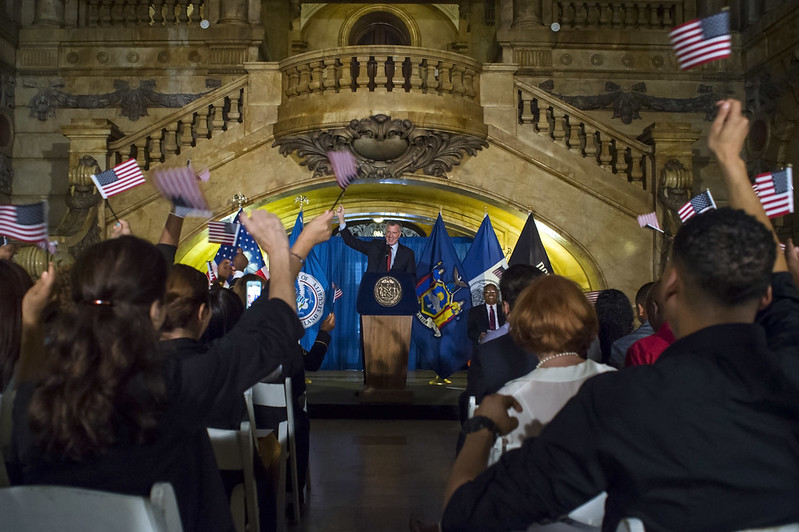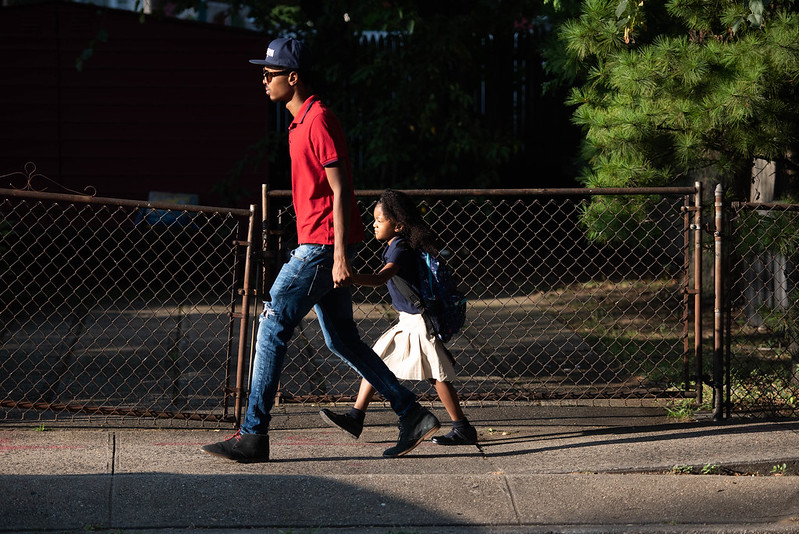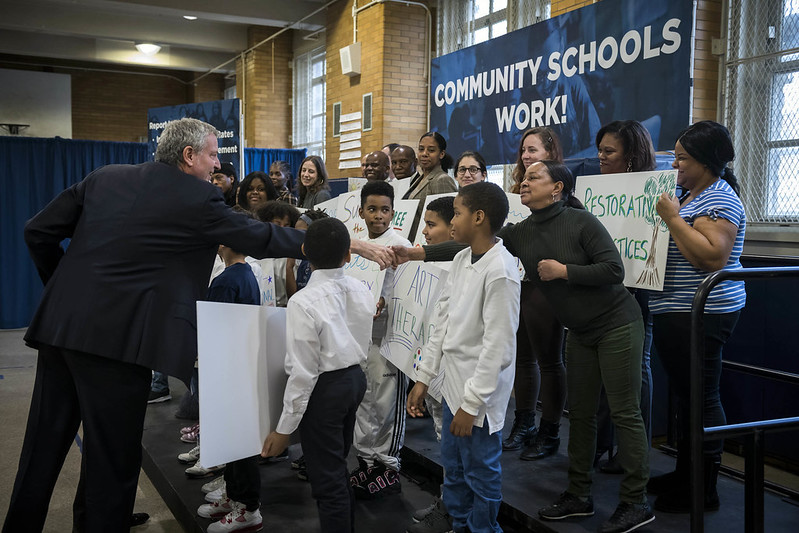Save the NYC Urban Fellows Program, Prepare the Next Generation of Public Service Leadership

Mayor de Blasio at a ceremony (photo: Ed Reed/Mayoral Photography Office)
This is not the time to cancel the NYC Urban Fellows Program, as the de Blasio administration appears on the verge of doing. It is a time to inspire young people to work in government. We need more opportunities for young people to work in government, not fewer. It is misguided and short-sighted to cut a program that managed to survive the 1975 fiscal crisis, and every New York City budget crisis that has followed.
The New York City Urban Fellowship is a very popular public service program that has stood the test of time – surviving and only getting stronger over 50-plus years and through seven mayoral administrations dating back to Mayor John Lindsay. It also helped give rise to the current mayor, and he shouldn’t forget that.
Much like President John F. Kennedy, Mayor Lindsay had a real knack for recruiting the best and the brightest young staff. They came to government with their passion for civic engagement, as well as energy and ambition, and they found opportunity, exhilarating hard work, and focus that many have said lasted throughout their careers.
The New York City Urban Fellows Program was one of the successful tools that was created at City Hall during the Lindsay years to channel the energy and enthusiasm “to do good” that many college graduates were expressing. The idea of the program was pretty straightforward: create a highly competitive, nine-month fellowship to introduce promising college graduates to public service. Fellows were given a wide array of choices. They could work in the Mayor’s Office or one of the many city agencies or neighborhood offices to gain hands on experience in serving New Yorkers in need of assistance. The fellowship also includes a weekly seminar where participants gather and learn about New York City government from various guest speakers including city commissioners.
As a senior at Fordham University in 1981, interested in public service but hesitant about taking the law school route, I stumbled across a flyer on a bulletin board in the Political Science Department that introduced me to the New York City Urban Fellows Program.
I was selected and went into the program with my eyes wide open, wanting to make a difference in the city where I was born, raised, and educated. It was a challenging and at times a frustrating experience. Along the way, I met lifelong friends and was inspired by mentors, many who have dedicated careers to making our city a better place.
Two years after my fellowship year, I was tapped to lead the Program. At the time, the Koch Administration was still wrestling with the 1975 fiscal crisis. To continue the program, I worked with Deputy Mayor Ronay Menschel to secure funding support from various foundations and corporations. NYU Wagner School of Public Administration chipped in by organizing a weekly seminar series.
For two years with the help of many alumni, we figured out a way to keep this fellowship afloat and scraped together outside funding. When the economy bounced back and with a balanced budget, Mayor Koch understood that the fellowship exemplified a great tradition of support for public service and restored city funding in 1985. Through the ups and downs over the years, the Urban Fellows Program has flourished. Mayor Bloomberg celebrated its 40th Anniversary with a festive event at Gracie Mansion with a strong core of the now more than 1,000 alumni that have had the opportunity to serve our city.
Unfortunately, the incoming class was recently told that the program will be suspended this Fall because of city budget shortfalls. It is supposed to start next week.
I understand that the fiscal picture is very bleak and requires deep and painful cuts. But it is my hope -- and the hope of a group of promising young public servants -- that Mayor Bill de Blasio quickly sees this decision as wrongheaded. This is a modest program with a big impact in recruiting and cultivating public servants as leaders. It has been instrumental in inspiring many public service careers including Mayor de Blasio, who was an Urban Fellow 36 years ago.
Especially now when our country is so divided, we need to make every effort on all levels of government to make public service appealing and improve civic engagement. Programs like the NYC Urban Fellows, inspire and bring young people from all backgrounds together. This year’s graduating class included students from Baruch, Brooklyn, Hunter, and City Colleges. There’s very good reason this program has been successful for over a half century – it works and has now been replicated in cities across the country. Let us continue and build upon this success.
***
Rob Walsh was the New York City Small Business Services Commissioner from 2002-2013 during the Bloomberg Administration. He now serves as a Senior Advisor to the Manhattan College President and is an Adjunct Professor at Columbia University School of International & Public Affairs. His segment the Bottom Line for Small Business can be heard weekly on 1010 WINS Radio.
***
Have an op-ed idea or submission for Gotham Gazette? Email This email address is being protected from spambots. You need JavaScript enabled to view it.
In a Remote Learning Reality, It’s Time to Answer the Bell for Equity

School will be either blended or all-remote (photo: Michael Appleton/Mayor's Office )
The City prudently delayed the reopening of schools this week, meaning all students will learn from home until at least September 21. Meanwhile, nearly 400,000 public school families had already opted for their children to learn fully remotely indefinitely — continuing a dramatic shift in the way we educate our kids. All of our 1.1 million public school students will rely on remote learning this school year, either entirely or significantly.
But the learn-from-home experience for students can be very different depending on wealth and income, exposing yet another painful consequence of our city’s systemic inequality. This is also just the latest hardship endured along racial lines for families dealing with the COVID-19 crisis; people of color make up more than four-fifths of those opting for remote learning as of August 28. Many of these families cannot risk infection because of pre-existing health issues.
And those families are also far less likely to have access to adequate technology and Internet service. Nearly half of households living in poverty do not have broadband Internet. The vast majority of those families are Black and brown. Make no mistake, unless access improves rapidly, their kids will not receive a quality education. The effects of that could permanently impair those students’ ability to succeed.
It is the fundamental responsibility of government to protect the people it represents from harm. Part of that responsibility is guaranteeing the right to a quality education. In this new paradigm, that means the digital divide is no longer merely an example of inequality — it is an example of injustice. Just like all New Yorkers have a right to healthy food, clean water, and safe shelter, they have a right to quality information access.
If we start with that truth, current efforts to provide broadband access, computers, and other equipment to millions of New Yorkers will have to be accelerated. That means a significant investment beyond what is already being spent.
But government budgets are devastated because of the pandemic-created economic crisis. Even if we prioritize spending on remote learning and this sea change in education, new dollars will have to come from somewhere.
Local Internet providers have pledged to help. But they have also been slow to close the digital gap. These utilities operate at the pleasure of New Yorkers, who grant them their franchises. Verizon pledged to wire every building with FiOS in 2008 when the City signed a provider deal. It has not. It is time to motivate Verizon with a deadline. If the company does not provide access for every public school family that needs broadband by the end of the calendar year, we should go shopping for a new provider.
The tech companies that make laptops, phones, and tablets also need to do more. The City spent $269 million on 300,000 iPads this year. That is nearly $900 a device with three months of Internet service. In other words, we are paying near retail to buy from behemoths like Google, Apple, and Microsoft, which have seen their market value explode during this crisis. They should be ashamed and offer us much larger discounts going forward.
Finally, tech companies like Facebook and Amazon, as well as those listed above, are making billions off of our personal data. By requiring those companies to report their sales of commercialized data, and applying a modest transaction fee, we can raise enough new revenue to ensure every New Yorker’s right to information and the means to access it.
State Senator Andrew Gounardes and I are working on a legislative framework to do just that. Once ready, the State and City should move swiftly to approve it.
Consider the success of our levy on the world’s previous most-lucrative commodity, oil. Gas taxes paid for an interstate highway system and much of our local infrastructure — and the cheap transportation of goods that came with it. But that was paid by consumers. This time around, let us make sure that the corporations are paying their due.
Failure to take these steps will certainly result in lower test scores and lost potential for our children, especially the most vulnerable. Even more unforgivably, it will assure an even deeper racial and economic divide than the one we have now. School is starting. We must answer the bell.
***
Eric Adams is the Brooklyn borough president. On Twitter @BKBoroHall.
***
Have an op-ed idea or submission for Gotham Gazette? Email This email address is being protected from spambots. You need JavaScript enabled to view it.
The City Must Restore Mayor's Misguided Cuts to Essential Community Schools Program

Mayor de Blasio at a community schools celebration (photo: Ed Reed/Mayor's Office)
As New York City prepares for a return to school, city leaders are once again turning to community-based organizations (CBOs) to play a central role in supporting the reopening of schools. This is understandable. CBO partnership has always been a pivotal cornerstone of success for our young people and families and it is again critical to the success of all of these reopening plans. But recent, deep financial cuts to the sector – and the potential for further cuts – makes this untenable.
The nonprofit sector's capacity has been stretched by the need to quickly build entirely new program models that prioritize the health and safety of children and staff during the coronavirus pandemic. And earlier this summer, on the evening of the last day of the city’s most controversial and volatile budget process in decades, education advocates learned at the last minute that the city’s flagship Community Schools Initiative had been cut by $9.16 million, impacting nearly 30,000 students, their families and communities.
This decision was made without the opportunity for the Council or the public to weigh in about their impact. The de Blasio administration's lack of transparency with these cuts was an egregious display of abuse of the powers of mayoral control of city schools.
New York City’s Community Schools, which provide a range of social services in the school setting, have been identified by city and state reopening councils as an intrinsic element to the school reopening plan. As the Department of Education (DOE) prepares to execute a new learning model for the upcoming school year, the Community Schools network is an integral part of the process and the chances for success. However, the DOE has yet to inform community school providers how the $9.16 million cut will impact programming and services.
Additionally, the DOE has failed to inform community school providers of the role we will play in meeting the child-care needs that will result from the blended learning model. Meanwhile, Governor Cuomo recently announced that more cuts to school aid across the state are coming, which would cut $2.4 billion from New York City schools. Last week, City Schools Chancellor Richard Carranza warned that 9,000 DOE jobs will be lost and all schools would need to go remote if the state decides to make these cuts. Schools cannot afford to lose the resources and support that CBO partners bring to the schools they work in on top of this.
Throughout this pandemic, the human services sector, including Community Schools, continued to provide crucial services for the hardest-hit communities, such as meals, trauma care, and support for parents, including with their children’s remote learning. These services have been and will continue to be critical to address the learning loss and trauma New York City students and their families are facing. The mayor’s own Education Sector Advisory Council emphasized how critical services provided by Community Schools will be in the new school year.
These cuts, which caught City Council members off guard, were implemented with no input from the communities they will impact. Mayor de Blasio and the DOE have circumvented a public, transparent due process – sending a devastating message to thousands of working families, especially in communities of color that were most impacted by COVID-19.
The rate of COVID-19 deaths in the city’s communities of color and low-income zip codes is many times greater than in wealthier, whiter areas. Community Schools disrupt the oppressive patterns of systemic racism that perpetuate de-prioritization and underinvestment in economically distressed communities. They level the playing field so that all children in New York City can have a better chance to thrive and succeed.
Restoring trust with families is a key piece of reopening schools successfully, but glaringly missing from the list of engaged stakeholders are the CBOs charged with providing in-school and out-of-school services. Among them are the community school providers who have developed deep community trust and developed expertise in running a blended model of learning in the Regional Enrichment Centers the city opened during this pandemic. The mayor and DOE should consider CBOs as an equal partner and leverage the trust they have built in communities and their expertise to successfully reopen schools.
Students, families, and communities need more resources, engagement, and equitable, collaborative partnerships now more than ever. Smart and swift investments must be made to support the provision of these resources, especially in our most vulnerable communities.
The community schools strategy presents the most cost-effective and evidence-based approach to reopen New York City schools in a way that centers students’ physical, emotional, and mental safety and well-being. To cut these services at a time when they are needed the most is unconscionable.
It’s just weeks from the start of the school year, and we’re still in the dark. If reopening schools, whether in-person, remotely, or blended is a priority, the mayor and Department of Education must restore this funding now.
***
Terrence Winston is Coordinator of the Coalition for Community Schools Excellence. On Twitter @CoalitionforCo2.
***
Have an op-ed idea or submission for Gotham Gazette? Email This email address is being protected from spambots. You need JavaScript enabled to view it.




